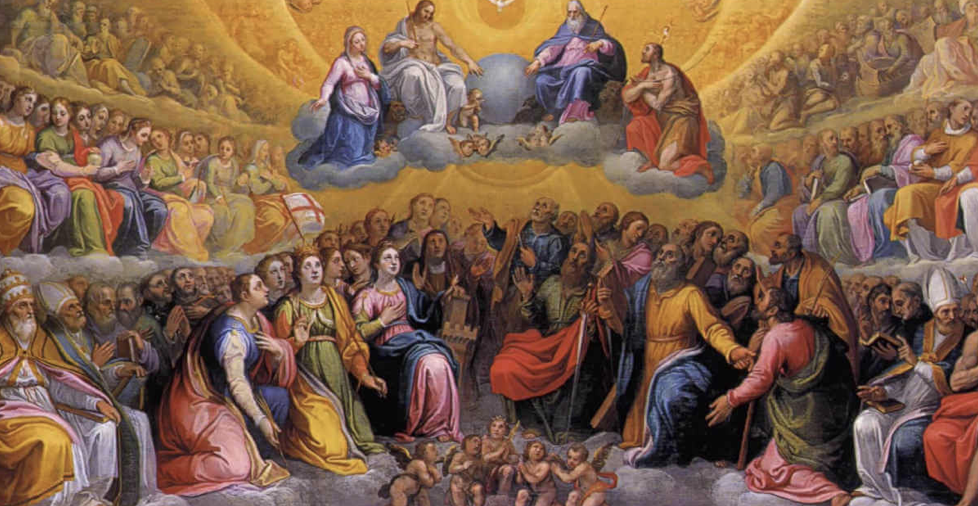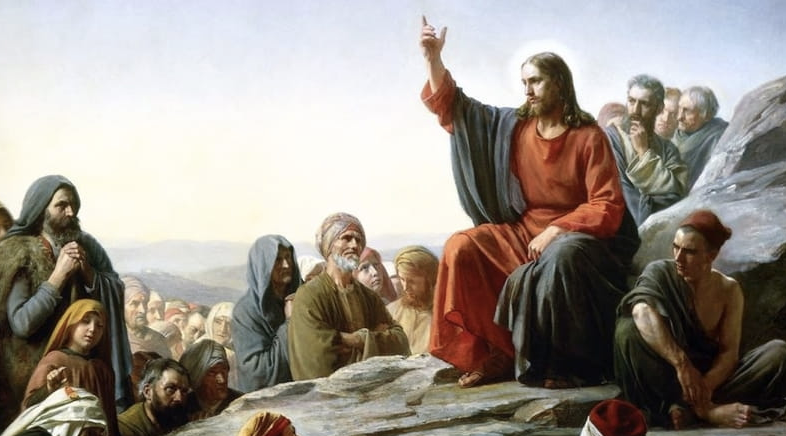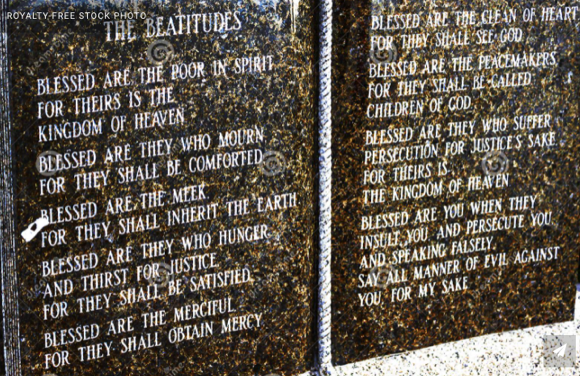
As we approach 1 November, All Saints Day, we might consider what makes a saint. One way of expressing this is the heroic practice of the cardinal virtues – prudence, justice, fortitude, temperance – and the theological virtues – faith, hope, charity. Another way is St John Paul II’s consideration of the Gospel account of the rich young man – “Teacher, what must I do to inherit eternal life?” in Chapter One of the Encyclical Veritatis Spendor: On Certain Fundamental Questions of the Church’s Moral Teaching. Another way is Jesus of Nazareth’s Sermon on the Mount, in particular the Beatitudes.

SHIMA YISRAEL
Observant Jews, twice a day, and as the last words before death, recite the Shema:
“Hear, O Israel: The Lord our God is one Lord; and you shall love the Lord your God with all your heart, and with all your soul, and with all your might. And these words which I command you this day shall be upon your heart; and you shall teach them diligently to your children, and shall talk of them when you sit in your house, and when you walk by the way, and when you lie down, and when you rise. And you shall bind them as a sign upon your hand, and they shall be as frontlets between your eyes. And you shall write them on the doorposts of your house and on your gates…”
This is the most recited and most beloved prayer of Judaism. It proclaims the Oneness of God at a time when almost all other peoples embraced polytheism rather than monotheism.
In 2006, a major in the Israeli Defence Force said the Shema before jumping on a grenade to protect his fellow soldiers.
Our Lord quite specifically refers to the Shema at Mark 12:29-31 when he refers to the command to love God “with all your heart, and with will all your soul, and with all your mind, and with all your strength” – and adds the words from Leviticus 19:18 “You shall love your neighbour as yourself”. This, together with the admonition – “You shall be holy for I the Lord your God am holy” – summarise the Hebrew Bible understanding of morality.
FULFILMENT
Jesus does not abolish the Jewish understanding of morality, but fulfils it. This is illustrated by the way Jesus takes the words of the Ten Commandments, or common understandings of morality in his own time, and explains their full meaning. The Sermon on the Mount recounted in Matthew 3-5, and the Sermon on the Plain recounted in Luke 6:17-49 are an elaboration of the Jewish understanding of morality. They illustrate the inter-relationship between the morality of the Hebrew Bible and the ethical teaching of Jesus of Nazareth. Jesus specifically says that he has not come to abolish the law and the prophets, but to fulfil them.
SERMON ON THE PLAIN
The difference between the lengthy Sermon on the Mount and the relatively brief Sermon on the Plain reflects the fact that the content of each was probably expressed by the Galilean, not once, but many times, in somewhat different ways, during his public life.

ALL THAT IS REQUIRED
According to St Thomas Aquinas the Sermon on the Mount contains all that a Christian requires to live his life. Aquinas points out that the Sermon on the Mount highlights in the Beatitudes the transcendental aspect of the Christian life which finds its fulfilment in God.
APOSTLES
St Thomas Aquinas refers to the comment in the Sermon on the Mount on the dignity of the Apostles (and their successors, the bishops in union with the Bishop of Rome) who here and now teach what Christ taught. He who does them (the Commandments understood in the light of the Sermon on the Mount), and teaches them, shall be called great in the kingdom of heaven.
INTERIORITY
Whereas the Ten Commandments mainly focus on exterior actions, the Sermon on the Mount, building on the Ten Commandments, focuses on disposition and intention.
Our Lord speaks of three characteristic Christian acts, and the interior attitude which ought accompany them:
- Prayer – “When you pray go into your room and shut the door.” It is at this point that we are given the Lord’s Prayer.
- Fasting – “When you fast, anoint your head and wash your face.”
- Almsgiving – “When you give alms, do not let your left hand know what your right hand is doing.”
ANXIETY
Our Lord speaks of money and material possessions, and the all-consuming anxiety that often accompanies the desire for money and material possessions: “Do not be anxious about your life, what you shall eat or what you shall drink, nor about your body, what you shall put on.”
JUDGMENT
Our Lord speaks of the interior actions with regard to our neighbour: “Why do you see the speck that is in your brother’s eye but do not notice the log that is in your own eye?” Our Lord’s hyperbole illustrates the supercritical attitude of those who are ever so quick to criticise others, ever so benign in considering their own conduct, whose judgments are distorted by harshness towards others, and indulgence in considering their own conduct.
CHRISTIAN LIFE
Finally, as Aquinas analyses the Sermon on the Mount, he considers the Christian life which involves:
- constant prayer (“ask and it will be given”);
- perseverance in difficulty (“enter by the narrow gate”);
- wariness of one’s own judgment (“not everyone who says ‘Lord, Lord,’ shall enter the kingdom of heaven”);
- rejection of poor advice (“beware of false prophets”);
- doing, not merely talking.
MOUNT OF CALVARY
As the late Bishop Fulton Sheen says, what Jesus taught on the Mount of Beatitudes he gave expression to on the Mount of Calvary. Suffering is part of any Christian life. The wisdom of the worldly wise:
- You live only once,
- Get as much out of life as you can,
- Who will ever know about it?
- Eat drink and be merry for tomorrow you die,
- Look after number one
is quite inconsistent with the wisdom of the Sermon on the Mount.

BEATITUDES
Drawing on the thought of St Augustine in the fourth century, St Thomas Aquinas, in the thirteenth century, and in the twentieth century Bishop Fulton Sheen, and Fr Servais Pinckaers, a Dominican moral theologian, one can explain the Beatitudes as follows:
| Conversion | |
| 1 Beatitude | Blessed are the poor in spirit for theirs is the kingdom of heaven |
| Antithesis | You cannot be happy unless you are rich |
| The Lord’s Prayer | Hallowed be thy name |
| Gift of the Holy Spirit | Fear of the Lord |
| 2 Beatitude | Blessed are those who mourn for they will be comforted |
| Antithesis | Laugh and the world laughs with you. |
| The Lord’s Prayer | Thy kingdom come. |
| Gift of the Holy Spirit | Knowledge |
| 3 Beatitude | Blessed are the patient for they shall inherit the land. |
| Antithesis | Don’t let him get away with it. |
| The Lord’s Prayer | Thy will be done on earth as it is in heaven. |
| Gift of the Holy Spirit | Piety. |
| Active Life | |
| 4 Beatitude | Blessed are those who hunger and thirst for righteousness for they shall have their fill |
| Antithesis | Do whatever it takes. |
| The Lord’s Prayer | Give us this day our day our daily bread. |
| Gift of the Holy Spirit | Fortitude. |
| 5 Beatitude | Blessed are the merciful for they shall obtain mercy. |
| Antithesis | Look after number one. |
| The Lord’s Prayer | Forgive us our trespasses as we forgive those who trespass against us. |
| Gift of the Holy Spirit | Counsel. |
| Contemplative Life | |
| 6 Beatitude | Blessed are the pure of heart for they shall see God |
| Antithesis | If nature gave you sex instincts you ought to give them free expression, otherwise you will become frustrated. |
| The Lord’s Prayer | Lead us not into temptation. |
| Gift of the Holy Spirit | Understanding |
| 7 Beatitude | Blessed are the peacemakers for they shall be called the sons of God |
| Antithesis | Stand up for your rights. |
| The Lord’s Prayer | Deliver us from evil |
| Gift of the Holy Spirit | Wisdom. |
| 8 Beatitude | Blessed are those who are persecuted for righteousness’ sake, for theirs is the kingdom of heaven. Blessed are you when men revile you and persecute you and speak all manner of evil against you falsely because of me. Rejoice and be glad, for your reward is great in heaven, for so men persecuted the prophets who were before you |
| Antithesis | Seek to be popular and well known. |

BROTHER RAYMER
Recently, one of my sons-in-law and grandchildren, while bushwalking out of Springwood, came across the following memorial:
“The Cross opposite was erected to honour the memory of Rev Brother GE Raymer (Christian Brother) who often led hiking parties through valleys in this district. He was drowned at Wollongong 23 July 1953 in an attempt to rescue a pupil.”
Who were you, Brother Raymer, probably long forgotten, certainly largely unknown? You were he of whom Our Lord said: “No greater love have a man than he who gives his life for his friend.” While you may not have died in odium fidei (through hatred of the faith), you are in the ranks of the saints, along with the martyrs St Stephen, St James, St Paul – as well as the Mother and her Seven Sons of whom we read in Maccabees, and the aged Eleazar, and indeed Our Lord himself. You are there in paradise with the Martyrs of the Church of Rome who died for the faith, the Martyrs of Ireland, the Martyrs of England, the Martyrs of China, the Martyrs of Korea, the Martyrs of Vietnam, the Martyrs of the Middle East, who are reviled and persecuted even today for Christ’s sake.
You are there in paradise, Brother Raymer! with those who have given their lives for love of Our Lord – the mother of children with the husband away travelling for work, the tradie performing his or her work in a worthy manner, joining that work with the sufferings of Christ – and the countless others who have given themselves largely unknown and forgotten! whose lives will never be scrutinised by the Sacred Congregation for the Saints, but whose lives are characterised by a response involving the heroic practice of the virtues; by the response set by Our Lord before the rich young man “If you would be perfect, go, sell what you possess and give to the poor, and you will have treasure in heaven, and come, follow me”; by the response set forth in the Sermon on the Mount, especially the Beatitudes.
BEYOND TIME AND PLACE
According to Bishop Fulton Sheen, the thought of the Galilean expressed in the Sermon on the Mount is beyond time and place. Because Jesus of Nazareth in his teaching in the Sermon on the Mount suits no time and place, he is a model for all times and all places. What St Augustine is expressing (mediated by Servais Pinckaers OP) is the ongoing action of the Holy Spirit as the Christian pursues his course from beginning to end along the way of the Beatitudes.
STAGES OF SPIRITUAL LIFE
St Augustine sees the Beatitudes as an expression of the various stages of the spiritual life, what is traditionally referred to as the purgative, the illuminative, the contemplative, with the eighth Beatitude an ever-present reality for anyone who seriously seeks to lead the Christian life.
ALL SAINTS DAY
So, Our Lord’s Sermon on the Mount explains what All Saints Day is about. No mean task! but a task for each of us! above all for the person up the back in the last pew! in the factory, on the farm, down the mine, in the office, in the media, in the university, in parliament, in the law courts! at home! at work! wherever! young or old! fit or unfit! healthy or unhealthy! here! there! for better, for worse! in good times and in bad!
Michael McAuley
29 October 2021
